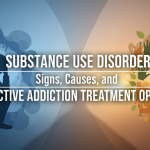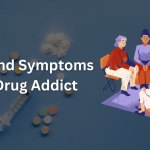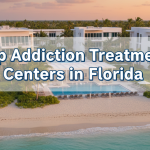Hydrocodone is a prescription opioid. It’s used to treat pain ranging from moderate to severe.
While it can be effective for short-term pain relief, prolonged use can lead to dependence. Once the body becomes dependent, stopping the medication often triggers withdrawal.
Understanding hydrocodone withdrawal symptoms is an important part of preparing for recovery. Withdrawal can be physically and emotionally challenging, especially for those who try to quit on their own.
Symptoms may vary from mild discomfort to more severe issues like nausea, anxiety, and intense cravings, depending on how long and how much hydrocodone was used.
That’s why professional treatment is so important.
Medical detox programs offer a safer, more comfortable way to manage withdrawal while addressing the underlying causes of opioid dependence. With the right support, it’s absolutely possible to move through this phase and into long-term recovery.
What Causes Hydrocodone Withdrawal?
Hydrocodone attaches to opioid receptors. These are located throughout the brain and central nervous system. They’re responsible for regulating pain, pleasure, and reward.
When you take hydrocodone, it reduces the perception of pain and can create a sense of calm or euphoria. Over time, however, the brain begins to adapt to the presence of the drug, adjusting its own chemistry in response.
As your body becomes used to hydrocodone, it stops producing certain natural chemicals, especially those related to pain relief and mood regulation, on its own. This is known as physical dependence.
When you’re dependent on opioids and you cut back or stop suddenly, the body struggles to return to a sense of natural balance, leading to the symptoms associated with withdrawal.
It’s important to understand that physical dependence is not the same as addiction. Dependence refers to the body’s adaptation to a substance. Addiction involves compulsive use despite negative consequences.
Someone can be physically dependent on hydrocodone without being addicted, especially if they’ve taken it regularly as prescribed. However, both scenarios can lead to withdrawal when use is discontinued, and in either case, professional support is key to managing symptoms safely.
Common Hydrocodone Withdrawal Symptoms
Hydrocodone withdrawal symptoms can range from uncomfortable to intense, depending on how long and how much of the drug was used.
These symptoms are the body’s way of adjusting to life without the opioid it had become dependent on. They typically fall into two categories, which are physical and psychological.
Physical Symptoms
- Muscle Aches
- Joint Pain
- Nausea
- Vomiting
- Digestive Issues
- Sweating
- Chills
- Fever
- Insomnia
- Restlessness
Psychological Symptoms
- Anxiety and Depression
- Intense Cravings
- Irritability and Mood Swings
100% Confidential Support is Available 24/7
No matter what you’re going through, you’re not alone. Our dedicated team is here to provide a safe, judgment-free space where you can talk openly and honestly. Whether you need emotional support, resources, or just someone to listen.
We’re here for you—completely confidential and always respectful of your privacy. Call us today!
Hydrocodone Withdrawal Timeline: What to Expect
The hydrocodone withdrawal timeline can vary depending on factors like dosage, how long the drug was used, and individual health.
That said, most people experience withdrawal in several distinct phases, each with its own physical and emotional symptoms. Here’s a general overview of what to expect as the body and brain begin to adjust to life without hydrocodone.
First 24 Hours: Early Symptoms of Opioid Withdrawal
Symptoms usually start within 6 to 12 hours after taking the last dose, especially for short-acting formulations of hydrocodone. This early phase brings increasing discomfort and growing psychological distress.
Common signs during this stage include:
- Anxiety or a sense of unease
- Runny nose
- Restlessness and irritability
- Muscle aches and joint stiffness
- Trouble sleeping or staying still
These symptoms may feel like a flu coming on, and while they’re relatively mild compared to what’s ahead, they signal the beginning of the withdrawal process.
Days 2–4: Peak Withdrawal
This is for most, the most intense and difficult phase of withdrawal. By this point, the body is fully reacting to the absence of the drug, and symptoms tend to peak in both severity and discomfort.
During this time, the experience can include:
- Nausea, vomiting, and stomach cramps
- Diarrhea and dehydration
- Chills, sweating, and hot flashes
- Heightened cravings for hydrocodone
- Intense mood swings, anxiety, or depression
This is when relapse risk tends to be highest, making medical and emotional support especially important.
Days 5–7: Subsiding Symptoms
By the fifth day, physical symptoms usually begin to taper off. The body starts to regain balance, and the flu-like symptoms often begin to improve.
However, many people continue to struggle with:
- Insomnia or disrupted sleep
- Lingering anxiety or sadness
- Low energy and general fatigue
- Emotional sensitivity
While things may feel more manageable, psychological symptoms can persist and even fluctuate unexpectedly.
Weeks 2 and Beyond: Post-Acute Withdrawal
Even after the worst of the physical symptoms pass, many people continue to face what’s known as post-acute withdrawal syndrome (PAWS). These lingering effects are primarily emotional and psychological and may last for weeks or even months.
Common symptoms during this extended phase include:
- Continued cravings
- Mood instability
- Difficulty concentrating
- Trouble sleeping
Contact Solutions Healthcare
Battling with Drug and Alcohol Addition? Remember, you are not alone and we are here to help you!
Factors Influencing the Hydrocodone Withdrawal Timeline
Several key factors influence how quickly withdrawal symptoms begin, how intense they become, and how long they last.
Dosage and Frequency of Use
People who have taken high doses of hydrocodone or used it frequently, especially multiple times a day, are more likely to experience a longer and more intense withdrawal period. The body becomes more dependent at higher levels, and breaking that dependence takes time.
Length of Time Using Hydrocodone
The longer someone has been using hydrocodone, the more entrenched the drug’s effects become in the body and brain. Long-term use typically results in a more gradual and extended withdrawal process, with symptoms that may take longer to fully resolve.
Co-Occurring Mental Health Conditions
If a person has underlying mental health disorders like depression, anxiety, or PTSD, withdrawal symptoms can feel more severe and emotionally destabilizing.
These co-occurring conditions can also complicate the recovery process, increasing the need for dual-diagnosis treatment and emotional support.
Individual Factors
Factors like age, metabolism, overall physical health, and even genetics can have a role in how quickly the body detoxes and recovers.
For instance, younger individuals or those in good physical condition may move through withdrawal faster, while others may need more time and support to heal.
Hydrocodone Withdrawal Treatment at Solutions Healthcare
At Solutions Healthcare, we understand how physically and emotionally taxing hydrocodone withdrawal can be. That’s why we offer a comprehensive, medically supervised detox program designed to ease symptoms, reduce risk, and lay the groundwork for lasting recovery.
The Importance of Professional Medical Detoxification
Trying to go through opioid withdrawal alone can be dangerous and overwhelming. Symptoms like severe nausea, dehydration, and mental health distress can quickly spiral without medical oversight. Detox provides around-the-clock monitoring to ensure safety and comfort throughout every stage of withdrawal.
Medication-Assisted Treatment (MAT)
For many clients, Medication-Assisted Treatment (MAT) can be a valuable part of the detox and recovery process.
MAT uses FDA-approved medications to reduce cravings, stabilize mood, and prevent relapse—especially during the early, high-risk days of withdrawal.
Common medications may include:
- Buprenorphine – Eases withdrawal symptoms and reduces cravings without producing a full opioid effect.
- Methadone – Often used in long-term treatment plans, methadone helps gradually taper opioid dependence.
- Clonidine – Addresses anxiety, agitation, and other physical symptoms associated with withdrawal.
These medications are carefully managed by Solutions Healthcare’s clinical team to provide relief without replacing one addiction with another.
Holistic Therapies and Supportive Care
In addition to medical treatment, Solutions Healthcare offers holistic support to help the whole person, not just the symptoms. Our goal is to treat the root causes of substance use while empowering individuals with tools to rebuild their lives.
Find Treatment for Hydrocodone Addiction
Withdrawal doesn’t have to be something you go through alone—and it shouldn’t be. With the right care and guidance, this difficult phase can become the start of something better.
At Solutions Healthcare, we offer compassionate, medically supervised detox and comprehensive outpatient services tailored to your needs. Whether you’re struggling to take the first step or looking for long-term support, we’re here to help you move forward safely, confidently, and with care.
Contact Solutions Healthcare today to learn more about your treatment options and get the support you deserve.
References
- National Institute of Health (NIH): Hydrocodone
- Frontiers in Pharmacology: Preclinical and Clinical Pharmacology of Hydrocodone for Chronic Pain: A Mini Review
- NIH: Withdrawal Management






















